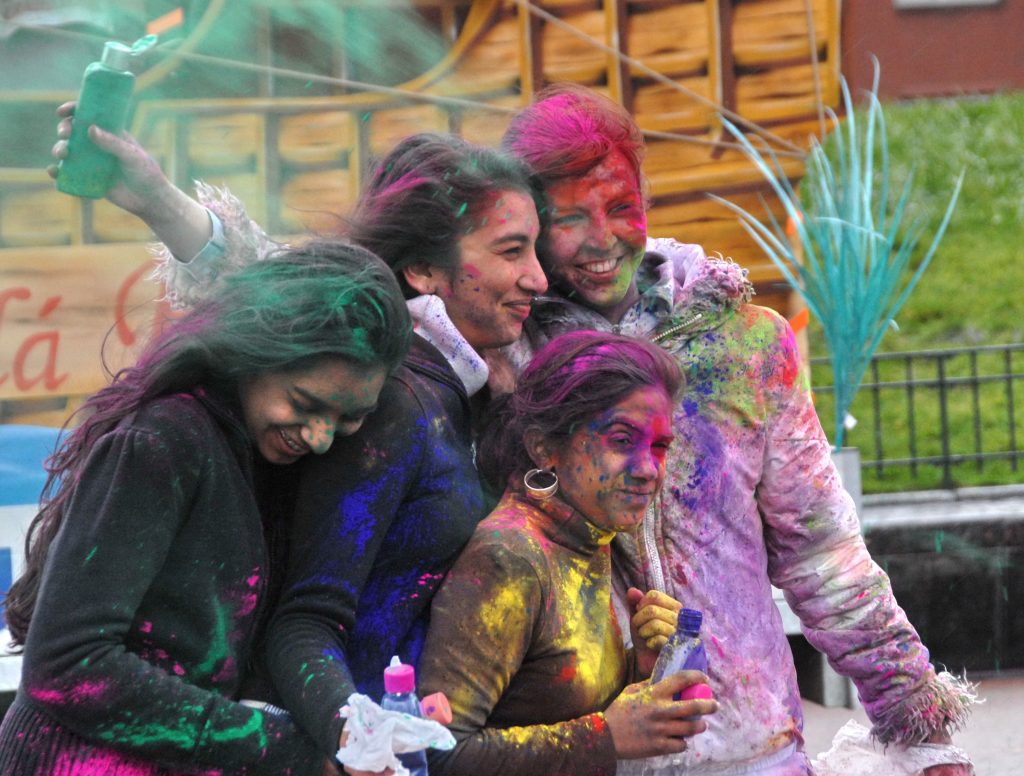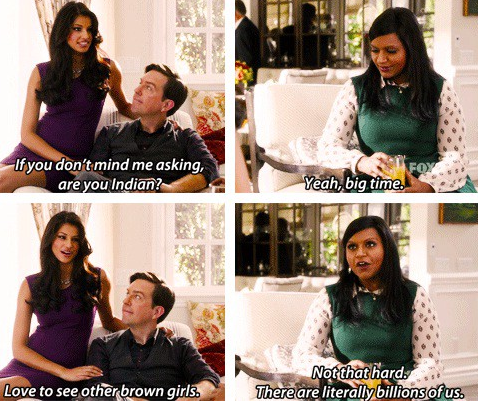
by Ami Sampat
The following post was republished with permission from Shots of Happiness.
As a thirty-year-old, I can finally admit this without feeling embarrassed: I have mostly Indian friends. Phew. That felt good to get off my chest.
So, why do I mainly have Indian friends? I grew up in Fremont, Calif., which is not nicknamed “Little India” for nothing. I had essentially what are “Indian” interests, so I attended Kathak classes and participated in Bollywood dance groups, garba teams, and culture shows in college. I was also pretty seriously part of an Indian community group for the first 20 years of my life. So yeah, a combination of all that and you can see how a majority of my closest friends are Indian like me.
(I feel like I need to add a disclaimer that yes, I do have (token) non-Indian friends!)
[Read More: Why I am Okay With Having a Lot of Indian Friends]
When I give a brief synopsis of my upbringing to those that I have just met, I can see them picturing me as “that stereotypical Indian girl.” You know who I mean: The girl who choreographs all the dances for her college’s Indian club, a bit of a drama queen, and very insular/cliquey.
Honestly, I don’t think that was ever me (aside from the loving to choreograph part) and I most certainly don’t think that is me now. I also don’t think I ever knew anyone like that in college either. And if they were dramatic or insular, I don’t think it had to do with their ethnicity or gender. Like, most people of other ethnic groups probably thought the same of their own.
It is funny: We are 10 years out of college and yet these assumptions are still being made. Many times I can just see it on their faces and a few even vocalize it. A few years ago an Indian guy, after hearing about my upbringing/Indian friends group, asked me if I was “one of those Indian girls.” What does that even mean? Is this an appropriate time to quote Mindy Kaling and say “There are literally billions of us”? Or does being able to quote “The Mindy Project” just add to my Indian girl stereotype?

Identity is such a personal thing and how one relates to their background/ancestry is entirely up to the individual. I do have to wonder why the judgment is okay one way, but not the other.
Most recently someone told me they don’t speak their mother tongue, felt like they were a “bad Indian,” and opened up about their insecurity regarding all of this. I listened and told them that they weren’t a bad Indian because there is no such thing and that there’s no one way to be Indian. A few days later I brought up that I had started a Meetup group based on South Asian literature and the person asked, “Do you mainly hang out with Indian people?”
Oh boy, here we go, I thought.
“Yee-sss?” I replied, unsure about how this conversation was going to go.
“Oh, well, I like to hang out with all different kinds of people,” they said. Well, I thought, that wasn’t the reaction I was hoping for but I guess this is the conversation we are having now. And so with a sigh, I began listing the reasons I shared above.
Later that night, I thought about that judgmental comment. I would never dream of making someone feel like they are a “bad Indian” nor would I make assumptions. I would never say “Oh, well, I think it is important to know your mother tongue” or essentially ask them to justify why they have the friends they have. And yet that person can make assumptions or comments about me? It’s ironic that someone who is insecure about their own identity felt secure enough to call me out on mine. Who named you the identity police?
[Read More: My Friends in India Are Afraid I’ll Get Shot in America]
Sure, I know that statement says a lot about the other person than it does me. But it still doesn’t make hearing comments like that any easier. It’s frustrating to feel like you’re being pigeon-holed and stereotyped at the age of 30. Haven’t we interacted with enough people at this point to know there is no stereotypical anything? We’re all special snowflakes in our own right.
Yes, my close friends are all Indian women, but there is more to them than just being Indian and a woman. They are also all kind, empathetic, friendly, welcoming, witty, independent, passionate, and extremely giving people. They’ve all done well for themselves in their careers in law, IT, tech, non-profit, and health fields. It is these nuances that make our friendship enriching. If someone were to judge me by my friends, I would be worried they would assume I am as amazing and accomplished as they all are. They set the bar really high and I can only hope to have half the good qualities they do. This is why I keep them around. They help me learn and grow as a person. It is what good friends do.
Sure, our ethnicity and gender likely affect how we view the world and I would be lying if I said I didn’t find that to be one of the most comfortable aspects of our friendship. But just as we have a lot of similarities, we have a lot of differences too.
[Read More: My Story of Living a Double Life: Indian and American]
In doing this mental check of all my friends, I thought about whether they would call themselves a “good Indian” or not. Actually, I just texted a few of them and none said yes outright. Since they are all so brilliant and thoughtful, it led to a few text discussions about what it means to be a “good Indian”. Isn’t it all just subjective? Who sets the standard for good or bad? Society? The individual? I don’t have any answers but it is interesting to think about.
Am I a “good Indian”? I’d venture to say probably not or that I am decent at best. I’m not religious. I’m thirty and unmarried (gasp). I may speak Gujarati but I’m not all that fluent. At this point, the most Indian thing about me is my insistence in making sure my one-year-old nephew can say foi or “dad’s sister” (it’s a work in progress).
All we can do is try to live the life that we want to live. How I identify with my background may be different than how you identify with yours. That is completely okay. Let us put an end to judgments and assumptions of any kind. We’d all be better for it.
Do you feel like you are judged on how you identify with your Indian-ness? How do you react?

Ami Sampat is a 30-year-old who lives in San Francisco and works in publishing. Some of her skills include reading standing up on a crowded bus, quoting every line of ‘Gilmore Girls’ ever, and crafting the perfect chip for her nachos. She enjoys traveling, photography, and writing, particularly with regards to women’s rights and issues relating to the South Asian diaspora. You can keep up with her on her website or Instagram.




